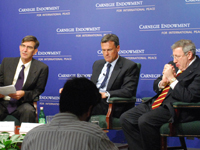Registration
You will receive an email confirming your registration.
IMGXYZ2765IMGZYXIn November NATO will review and endorse a new Strategic Concept. A revised nuclear policy is likely to be a core element. It remains to be seen how extensively NATO revises its 1999 Strategic Concept and in which directions its strategy shifts. Detlef Waechter of Carnegie discussed the future of NATO’s nuclear posture with Frank Miller, who previously served on the National Security Council staff and in the Pentagon and is presently a Principal of the Scowcroft Group. Waechter recently wrote a Policy Outlook on NATO’s reconsideration of its nuclear policy. Carnegie’s George Perkovich moderated.
Competing Preferences on Nuclear Policy
Efforts to revise the Strategic Concept had initially sparked cautious though divisive debates throughout the Alliance, particularly leading up to the April Foreign Ministers meeting in Tallin, Estonia. Alliance observers were concerned that an overly contentious debate could unsettle NATO.
A Likely Solution
Waechter explained that U.S. Secretary of State Hillary Clinton managed to reconcile many of the divided parties by suggesting a compelling set of five principles for NATO to follow:
- Remain a nuclear alliance.
- Members should share the various risks and responsibilities.
- Reduce the role of nuclear weapons in NATO’s posture.
- Pursue missile defense, ideally in concert with Russia.
- NATO should “specify the conditions for further arms control agreements with Russia.”
The new Strategic Concept will likely be based on Clinton’s five principles. Whether the Strategic Concept will address global zero, the goal of a nuclear-weapons-free world, remains unclear.
Expectations and Hopes for Lisbon
- Strategic Concept: The panelists agreed that, given the brevity of the document, the Strategic Concept will presumably address nuclear forces quite briefly, leaving a great deal of ambiguity.
- Nuclear Posture Review (NPR): Senior officials from NATO countries should conduct a review to consider how NATO ought to construct its future nuclear policy. Since NATO’s Nuclear Planning Group does not include France, Waechter suggested that the Alliance rely on experts from member states’ capitals to carry out this review. Miller concurred. The review could identify a wide spectrum of viable options for adapting NATO’s policies. Both panelists agreed that Secretary General Anders Fogh Rasmussen should actively support this NPR.
- Russia: The Alliance should deepen its engagement with Russia, particularly endeavoring to negotiate reductions of short-range nuclear weapons, discuss conventional forces, promote transparency, and more actively use the NATO-Russia Council, said Waechter. While NATO has dramatically reduced its tactical stockpile by two thirds in the past two decades, Russia has not taken commensurate steps. Any dramatic changes in NATO’s nuclear posture (such as a withdrawal or redeployment of weapons) should be a result of, and not a precondition for, future talks with Moscow. Waechter also suggested that integrating Russia into NATO’s missile defense decisions would be productive, though difficult.
- Principles of NATO: Miller called for NATO to recommit itself to its founding principles. This includes revisiting the following:
- Article V: The Alliance should reiterate the enduring relevance of Article V, which states that an attack against one member of the Alliance is an attack against all. This article has only been invoked in the context of the September 11 terrorist attacks.
- Missile Defense: A more expansive missile defense program would augment NATO’s defensive and deterrent capabilities and should play into NATO’s new posture, Miller argued. He suggested that the missile defense system should focus on threats from Iran, and should not be set up to defend against China or Russia. Waechter noted, though, that it is unlikely NATO would name a specific target at Lisbon.
- The United States: Historically, the United States has played a leadership role in NATO. Miller was pleased to see stronger U.S. leadership from Clinton at NATO’s April meeting in Tallin, Estonia, and expects the United States to lead once again at Lisbon.
- Article V: The Alliance should reiterate the enduring relevance of Article V, which states that an attack against one member of the Alliance is an attack against all. This article has only been invoked in the context of the September 11 terrorist attacks.
Ideally, in the long term, NATO would move to create a nuclear-weapons-free zone from the Atlantic to the Urals, the panelists agreed. However, such movement will necessarily be cautious and gradual. As Waechter noted in his Policy Outlook that framed the discussion, “this middle-of-the-road course [may well appear] uninspired, too cautious, or overly bureaucratic... but it is most likely the right course because it is the only realistic way forward.”
